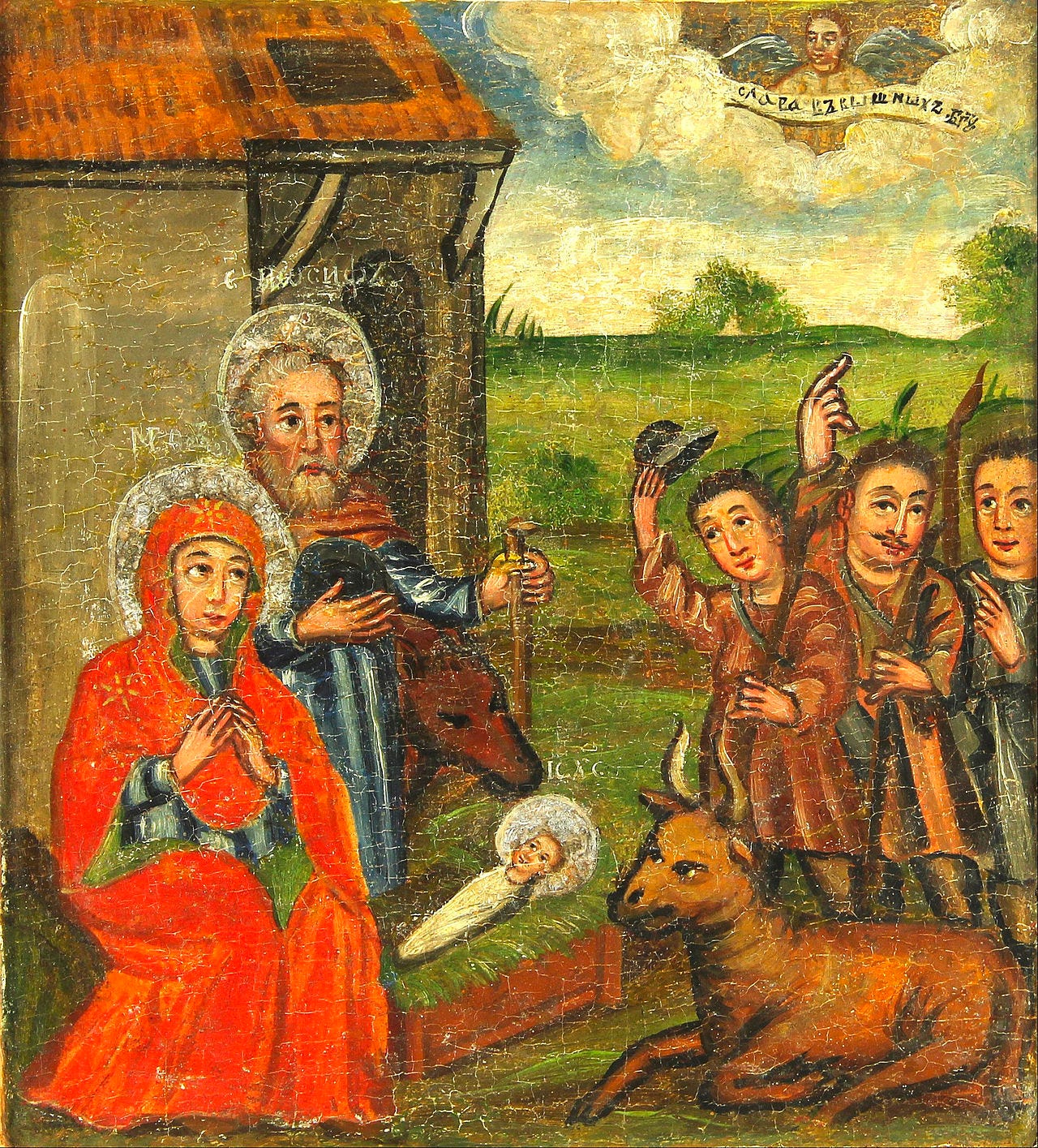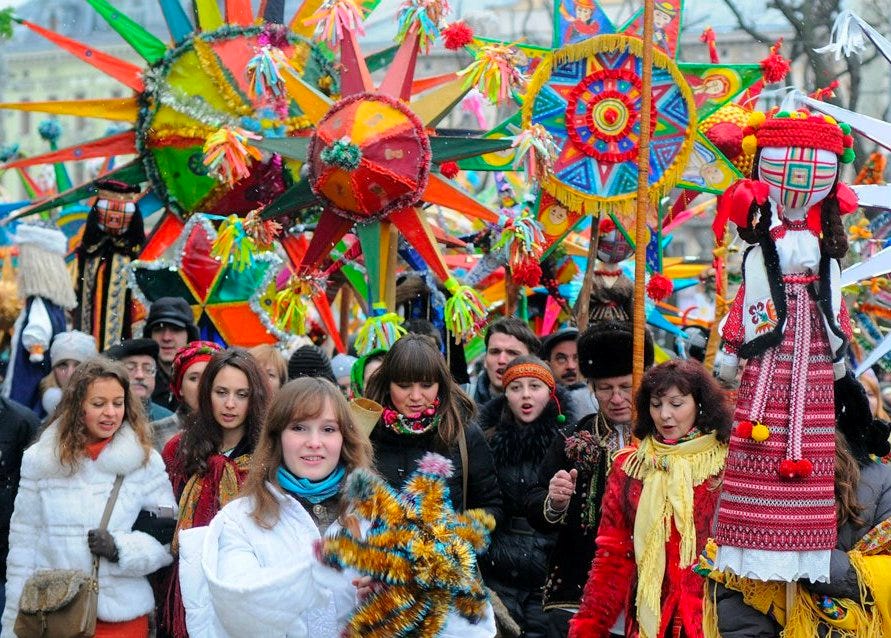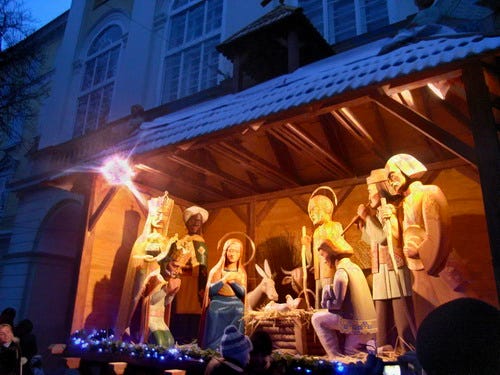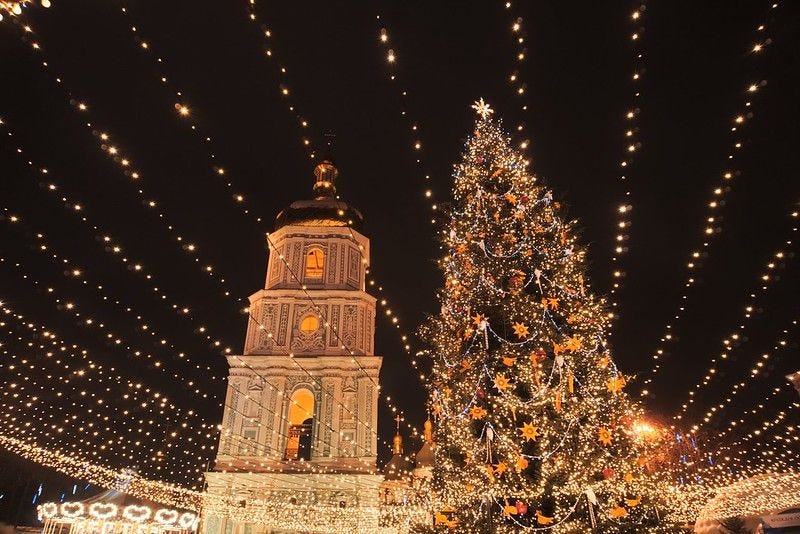
Before Russia sent a full-scale invasion of troops across Ukraine’s borders last February, a set of Ukrainian Church leaders were part of a mostly-quiet debate about how to address a centuries-old calendar dispute, which sees Eastern Catholics and Orthodox Christians celebrate Christmas almost two weeks after their Roman Catholic and Protestant counterparts.
The debate was mostly the purview of the theologians and historians — the kind of inside baseball unlikely to attract much attention from most Ukrainian churchgoers.
But Russia’s invasion of Ukraine has changed the conversation.
While Ukrainian Christians of the Byzantine tradition celebrated Christmas on January 7 this year, debate about when they should celebrate next year has become emotional and widespread -- with many believers arguing that changing Church calendars is a matter of national pride, and an important statement about Ukraine’s independence from Russia.
Christmas has passed this year, but the debate is ongoing.
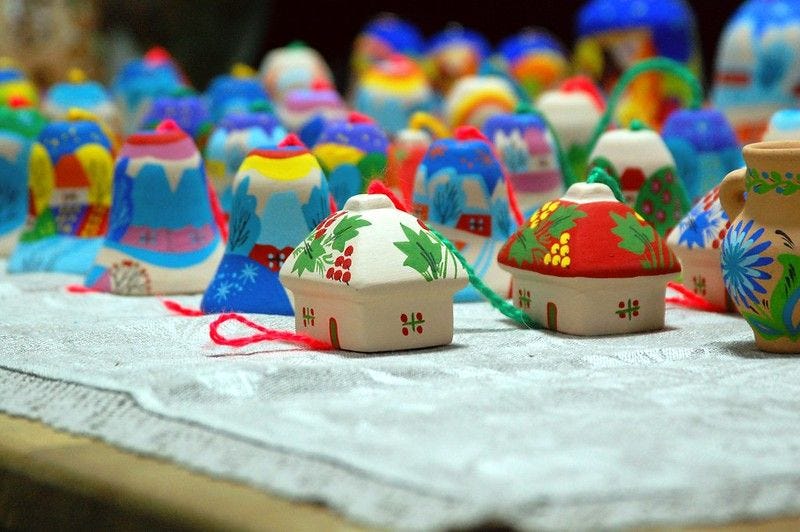
—
A tale of three calendars
In the West, most Christians celebrate Christmas on Dec. 25, because they follow the Gregorian calendar, which was introduced by Pope Gregory XIII in 1582, as a reform of the Julian calendar, which had been introduced by Julius Caesar in 46 BC.
From Gregory’s view, the trouble with the Julian calendar is that it overestimated the length of a year by about 10 minutes, which might not seem like a lot, but which added up over the centuries, leaving the calendar drifting from the cycles of the seasons.
Gregory shortened the year by .0075 days, recalculating how leap years would work, and aligning the actual vernal equinox with the date at which it was set on the Church’s calendar.
Introducing the calendar also meant fast-forwarding by 10 dates when the switch was made. And because the difference between dates on the Gregorian and Julian calendars grows over time, the calendars are actually now 13 days apart.
The Eastern Orthodox churches, which by that time were split from communion with the pope, did not accept the Gregorian calendar. They kept using the Julian calendar. That meant that all the feasts of the Church were celebrated by the Orthodox almost two weeks after they were celebrated by Catholics.
Until 1923.
In that year, some Orthodox Churches agreed it would be good to align the dates of most feasts with the Catholic Church. So they agreed on a new calendar, the “revised Julian calendar,” whose dates align on most things - including Christmas - with the Gregorian calendar.
But the Orthodox Churches in Ukraine follow the Julian calendar, and for the most part, so does the Ukrainian Greek Catholic Church, which formalized communion with Rome in 1596, after the Roman Church had adopted the Gregorian calendar. That means that Orthodox and Ukrainian Catholic believers in Ukraine celebrate Christmas on January 7, weeks after Roman Catholics and Protestants in the country, and around the world.
While Ukrainians have debated changing the calendar for years, the Russian invasion of the country has made the issue more acute.
For a large part of Ukrainian society, the Julian calendar is perceived as a marker of the "Russky mir," because the Russian Orthodox Church is the largest and most influential Orthodox Church in the world adhering to the old calendar.
To address the issue, Ukraine’s Ministry of Culture conducted a national survey recently, which shows that 60% of Ukrainians support a change to the revised Julian Church calendar.
Some have said the move would be one more step away from Moscow, but many are also guided by religious motives, wanting to synchronize Christmas with the rest of the Christian world.
But while the issue is debated, the heads of some Ukrainian churches have been circumspect.
—
The Orthodox Churches
The Ukrainian Orthodox Church of the Moscow Patriarchate - the Ukrainian Church under the patronage of Patriarch Kiril - has several dozen Romanian-speaking parishes in Ukraine, which live according to the Revised Julian calendar, as do their Romanian Orthodox brethren on the other side of the Ukrainian-Romanian border.
But apart from those exceptions, UOC-MP leaders have said they are not open to the switch, emphasizing that the old calendar is a marker of the Church’s own identity, as it is for the Russian Orthodox Church itself.
On the other hand, leaders in the autonomous Orthodox Church of Ukraine have been discussing a transition to the “new” calendar since 2019, when the Church was recognized as autocephalous by the Patriarch of Constantinople.
The possibility of changing calendars is motivated in part by the Church of Constantinople’s move to the revised Julian calendar in 1924, and in part by the OCU's emphasis on its autonomy from Russian influence.
There are signs that the OCU is getting close to making a switch.
In October, the OCU’s governing synod passed an exception to its general calendar, permitting Christmas services on Dec. 25 in any parish where pastoral circumstances or the “desire of the faithful” warranted it, and to celebrate other Christmastide feasts according to the revised Julian calendar.
Priests celebrating Christmas on Dec. 25 were required to submit a report to the bishops on the number of participants attending December Christmas liturgies.
—
Father Victor Pushko, pastor of the OCU’s St. Sophia Church in Lutsk, told The Pillar that his eparchy has already experimented with changes to the date of Christmas.
Two years ago, local Metropolitan Mykhail Zinkevych allowed a Dec. 25 celebration of Christmas in the diocesan cathedral, Pushko recalled. But people expected to continue celebrating Epiphany in late January, he said. When priests celebrated the popular Epiphany blessing of the city’s river on January 6, continuing to follow the revised calendar, few people came.
“People celebrated Christmas according to the 'new' calendar, and then returned to the 'old' one,” Pusko recalled.
While many young believers are supportive of celebrating Christmas on Dec. 25, few appreciate the implications of modifying the entire liturgical calendar — presenting a pastoral issue for the Church, Pushko said.
“If you look at the decision of the synod of the OCU, it does not mention the transition to the new calendar. The decision of the synod refers only to Christmas and only this year. And this is done to study the general church situation. In our diocese, six parishes expressed a desire to switch to the new, [revised] Julian calendar completely,” Pushko said.
But the priest said there is a danger of the Church fracturing if a wholesale calendar change is made.
“If we talk about the OCU as a whole, then in my opinion, the biggest reservation about the complete transition to the [revised] Julian calendar is the threat of a schism between new calendarists and old calendarists.”
Noting that dozens of formerly UOC-MP parishes have joined the OCU in the last year, Pushko said changing the calendar could deter other parishes considering making a switch.
But Pushko said the UCO is already split on what to do about the calendar. He said nearly every parish he knows has parishioners insistent that a change should be made - especially in light of the invasion - and others equally reserved about it.
The priest said he believes the OCU might have to consider the simultaneous use of both calendars for some period of time.
“Among the arguments for the transition to the new calendar, most common among people is the desire to distance ourselves from Moscow. In second place is the argument that it is the right thing to do and we need to get rid of calendar schizophrenia — because the Julian calendar lags behind the astronomical calendar by 13 days, and therefore we celebrate first the new year and then Christmas,” Pushko explained. “Less often mentioned is the desire to celebrate with other Christians.”
No matter the reason, Pushko said he believes there is little energy for a wholesale calendar change in the OCU.
“The problem is that all these discussions come to life only in December. When people start talking about the calendar not only on the eve of Christmas, but also in the summer or on the eve of other holidays, then I will believe that there is a real desire and readiness to transition,” Pushko concluded.
📰
Fr. Mykolai Lahodych of the OCU in Chernivtsi is also skeptical about the transition to the new calendar.
Lahodych told The Pillar that he considers the prospect of the OCU transitioning to a revised calendar unlikely, because, according to him, most people would not support the move.
“An online survey was conducted in our community. Approximately 60% of the parishioners expressed a desire to celebrate Christmas according to the revised Julian calendar. [But] a stable community of ‘old calendarists’ also formed.”
For its part, the OCU parish where Lahodych serves decided to celebrate Christmas, and other Christmastide feasts, according to the revised Julian calendar.
“As for me, it is too early to make any conclusions. This year is not the best for this liturgical experiment since December 25 fell on a Sunday. Over time, we will be able to say something more because, in our parish, all the feasts of the Christmas cycle - the Circumcision, the Presentation, the Annunciation, and the Nativity of John the Baptist will also be celebrated according to the New Julian calendar. It will show if there is a real request for calendar reform from the flock," Fr. Lahodych told The Pillar.
—
The Ukrainian Catholics
In the Ukrainian Greek Catholic Church, discussions about changing the calendar have been ongoing for more than a century, but have significantly intensified in the last decade.
The UGCC is part of the Catholic Church, which mostly lives according to the Gregorian calendar, and most Ukrainian Catholics live in predominantly Latin Catholic parts of the world.
But not all Ukrainian Catholics outside of Ukraine have been eager to observe the Gregorian liturgical calendar. Since the 1950s, some Ukrainian communities in the United States and Canada have pushed back on efforts to see them worship according to the Gregorian calendar.
Their motivation was twofold: on the one hand, the calendar for them was a symbol of connection with the homeland and a marker of identity, and a barrier against assimilation; on the other hand, leaders hoped to separate their celebration of Christmas from the secularized “X-mas” they encountered in Western culture.
The Ukrainian Greek Catholic Church in Ukraine experienced a revival of vitality after Ukraine gained independence from the Soviet Union in 1991.
Since that time, UGCC leaders have emphasized that a transition to a new calendar is possible only if the Church reaches a common decision with the Orthodox Churches, to avoid creating new lines of division between Christians of the Byzantine tradition in Ukraine. UGCC Leaders have noted that many Ukrainian villages have both Orthodox and Catholics parishes, and families are often interdenominational.
But since the Russian invasion, priests and lay Ukrainian Catholics have gotten impatient for a move away from the Julian calendar, which most associate with Russia, and therefore with Putin.
Still, the Ukrainian Catholic bishops seem in no hurry to change their approach.
In November 2022, the UGCC's Synod of Bishops refrained from approving a calendar reform measure, and announced instead that bishops would continue studying this issue.
Since that meeting, Metropolitan Sviatoslav Shevchuk has emphasized that a transition to a new calendar would affect not only the date of Christmas, but every feast and holy day, and therefore requires more extended preparation.
Shevchuk has also added that war relief efforts should take priority over calendar reform, and emphasized his desire to make calendar reforms an ecumenical Ukrainian project - which suggests that any eventual calendar reform would see the UGCC move to the revised Julian calendar, along with Orthodox Ukrainians.
As Catholics have pushed for a move from the Julian calendar, some parishes have begun collecting signatures, urging bishops to consider the possibility of transition.
Fr. Taras Baitsar, a UGCC priest of Sknyliv near Lviv, told The Pillar that after the Ukrainian parliament in 2018 made December 25 a national holiday - with the day off for most Ukrainians - many people began to approach him with questions.
“There is a strange situation” in his parish, Baitsar said.
“[December 25] is now a national holiday - Christmas; everyone has a day off on this day. All Catholics in the world celebrate Christmas on this day, but we are Catholics, and we do not.”
“So people said, let's pray on this day to unite spiritually with those who celebrate Christmas on this day, with the Holy Father, with the rest of the Catholic Church. This is a natural reaction of a Christian! And you will not do it without at least some attribute of Christmas, because it is Christmas,” the priest added.
The priest said that interest in the calendar has increased dramatically since the Russian invasion.
"This issue has become a sign of our identity. The state and society have made a huge step away from Russia, the Soviet past, and the ‘Russky mir,’” he said.
“We have no arguments why we could not overcome this rudiment in the form of the Julian calendar in the wake of those great changes for which we pay a high price. People began to come up en masse with questions about whether we had already moved. Some told me that their family had decided to celebrate Christmas on December 25. It was a difficult pastoral problem that had to be solved somehow. We did not have a Christmas liturgy, but we still had an orchestra performance and after that a concert of carols. The people had a joyful holiday,” Fr. Baitsar told The Pillar.
Baitsar’s parish, together with the neighboring community, decided to address the eparchial metropolitan with a letter which confirmed that the parish would like to see the calendar change.
“We just wanted to say that there is a willingness, and to give a reason to our metropolitan to voice this desire at the Synod. Because the head of the UGCC, Sviatoslav Shevchuk, said in the media that the initiative in this matter should come from below,” Baitsar explained.
In a response to the Sknyliv parishioners’ letter, Metropolitan Ihor Vozniak of Lviv thanked Catholics for their active position, but did not indicate that a change would be forthcoming.
—
Ukraine's other Greek Catholics
Events have unfolded differently in the Mukachevo Greek Catholic Eparchy in Ukraine’s southwest.
The Mukachevo eparchy is part of the Ruthenian Catholic Church, and is directly subordinate to the apostolic see. When parishioners in the 380,000-member eparchy requested that Christmas be moved to December 25, Bishop Nil Lushchak permitted parishes to transition to the Gregorian calendar, if a majority of parishioners requested the change.
Transfiguration of the Lord Parish in Uzhorod was the first parish in the eparchy to officially switch to the Gregorian calendar.
Father Vasyl Bushko, Transfiguration’s pastor, told The Pillar that the decision to switch was not spontaneous.
“We are close to the border, and many people have families in Slovakia or Hungary, where the Gregorian calendar is used. We also have mixed couples, Greek and Roman Catholics, and they celebrated twice. Therefore, people have long been asking about the possibility of transition. Of course, the war became an additional incentive for the transition.”
Fr. Bushko said that when a poll showed 97% of his parishioners wanted the transition, he appealed to Bishop Lushchak, who okayed the request.
Four other parishes in the eparchy have also switched to the Gregorian calendar. And Bushko said he expects that by September 1, when the new liturgical year begins in the Byzantine tradition, most of the Mukachevo diocese will switch to the new calendar.
“I think that now is a good opportunity for transition. I felt it was a small ‘victory’ for people, which we need now. They want to escape from all this, related to Russia,” Fr. Bushko concluded.

—
What's next?
As Ukraine’s war with Russia continues, believers are increasingly eager to shed their affiliations with Russia, including their connection to the Julian calendar. But it is not clear when the issue might be fully resolved.
For his part, UGCC Metropolitan Shevchuk urged the OCU’s Metropolitan Epifaniy Dumenko to form with him a joint working group to develop specific proposals for a common calendar transition - which Shevchuk said could be accomplished ahead of the 1,700th anniversary of the Council of Nicea, held in the year 325..
The OCU has not yet responded to that suggestion.
But the issue could get solved another way. Pope Francis in recent months has signaled openness to finding a common date with Orthodox Churches, including Constaninople, for Easter. If that happened, it would likely eliminate the differences between the revised Julian calendar and the Gregorian system, making easier an agreement between the churches of Ukraine.
📰

